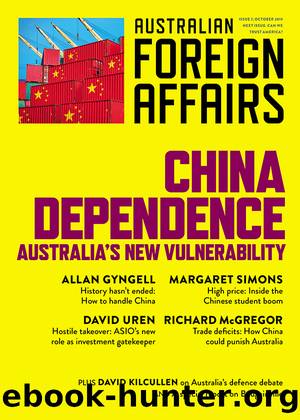China Dependence: Australia's New Vulnerability by Jonathan Pearlman

Author:Jonathan Pearlman [Pearlman, Jonathan]
Language: eng
Format: epub
Tags: Geopolitics, Political Science
ISBN: 9781760641665
Google: YWRdxQEACAAJ
Goodreads: 45420285
Publisher: Black Inc Books
Published: 2019-10-14T00:00:00+00:00
Turnbull changes tune
When Malcolm Turnbull overthrew Tony Abbott to claim the prime ministership in August 2015, security officials were reportedly worried that he would not take Chinaâs apparent threat to national security seriously. It was âprobably the first time since Whitlam where we have had a prime minister where we donât know where he stands on national security groundsâ, an unnamed official was quoted as saying in The Australian Financial Review.
But new currents soon started to reshape Australiaâs relationship with China.
Abbott had seen Xi as a modernising leader who was getting tough on corruption and promising reform, and who might even lead the nation to a form of democracy. By 2016, the Turnbull government viewed the Chinese administration in a much harsher light.
It is hard to identify a single catalyst for the change. Chinaâs military installations in the South China Sea were a source of friction with the United States and its allies, Australiaâs embassy in Beijing was doubtless reporting tighter censorship and the mass detention of Uighur people in Chinaâs west, and there was alarm over cyber intrusions, including a major disruption of the Bureau of Meteorology that Australian authorities reportedly attributed to âstate actorsâ.
The Darwin deal was completed two months after Turnbull became prime minister. In response to the concerns about the lease, the foreign investment regulations were amended to ensure that future transactions involving âcritical infrastructureâ, whether this infrastructure was government-owned or not, would be referred to the FIRB.
In late 2015, Turnbullâs new treasurer, Scott Morrison, announced the appointment of David Irvine to the board of the FIRB. Irvineâs impressive CV included heading each of the major intelligence agencies, ASIO and ASIS (the Australian Secret Intelligence Service), and serving as Australiaâs ambassador to China in the early 2000s. âIn the years ahead, it will be increasingly important for FIRB to not only have the commercial expertise and background to deal with complex commercial transactions, but to also have an even greater understanding of the broader strategic issues, including national security issues, that are essential to protect our national interest,â Morrison said.
In a further indication of the Turnbull governmentâs hardening approach, Morrison announced decisions to block two Chinese investments. The first was the Kidman cattle properties in South Australia, West Australia, Queensland and the Northern Territory, which covered 100,000 square kilometres. Although a financial minnow, with annual sales of less than $70 million, it was the largest private land-holding in the country. One of the Kidman properties overlapped with the Woomera Prohibited Area in South Australia, and Morrison indicated that this was a problem with a Chinese buyer. The property was in the lowest-security âgreen zoneâ, some 650 kilometres away from the Woomera base. Morrison said he would reconsider the deal if that property were removed. When the vendors restructured the sale to exclude this property, Morrison still had concerns about the size of the holdings, covering 1.3 per cent of Australiaâs landmass, leading the Chinese buyer to withdraw.
The then chair of the FIRB, investment banker David Wilson,
Download
This site does not store any files on its server. We only index and link to content provided by other sites. Please contact the content providers to delete copyright contents if any and email us, we'll remove relevant links or contents immediately.
| Anthropology | Archaeology |
| Philosophy | Politics & Government |
| Social Sciences | Sociology |
| Women's Studies |
Born to Run: by Christopher McDougall(6914)
The Leavers by Lisa Ko(6817)
iGen by Jean M. Twenge(5187)
Sapiens by Yuval Noah Harari(5141)
The Kite Runner by Khaled Hosseini(4975)
Spare by Prince Harry The Duke of Sussex(4817)
Bullshit Jobs by David Graeber(3860)
Machine Learning at Scale with H2O by Gregory Keys | David Whiting(3701)
Never by Ken Follett(3564)
Livewired by David Eagleman(3547)
Goodbye Paradise(3473)
Fairy Tale by Stephen King(2995)
A Dictionary of Sociology by Unknown(2869)
Harry Potter 4 - Harry Potter and The Goblet of Fire by J.K.Rowling(2831)
The Social Psychology of Inequality by Unknown(2782)
The Club by A.L. Brooks(2763)
0041152001443424520 .pdf by Unknown(2638)
People of the Earth: An Introduction to World Prehistory by Dr. Brian Fagan & Nadia Durrani(2633)
Will by Will Smith(2610)
